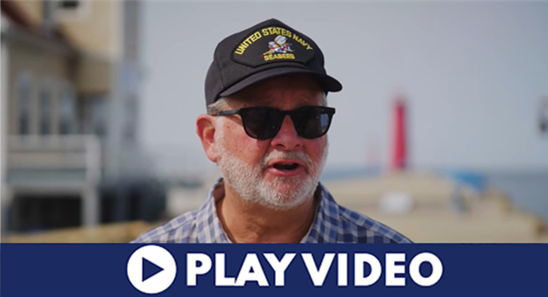ICYMI: Senator Peters Featured in New TV Segment on National Center of Expertise Peters Established to Protect the Great Lakes From Potential Oil Spills
DETROIT, MI – U.S. Senator Gary Peters (MI) was recently featured in a new TV segment produced by Detroit PBS and Great Lakes Now, a public media program covering issues affecting the future of the Great Lakes. The segment highlights the critical work of the U.S. Coast Guard Great Lakes Center of Expertise, which Peters established in 2018 through legislation he authored and passed into law. Peters created the Great Lakes Center of Expertise to study the impacts of oil spills in freshwater environments and help develop effective responses to protect the Great Lakes from a potential spill, given current oil spill response technologies are primarily designed for saltwater environments.
Detroit PBS / Great Lakes Now: Oil Spills and Buried Rivers
Click HERE or on the image above to watch the segment.
Peters led the effort to establish the Great Lakes Center of Expertise after the then-Commandant of the U.S. Coast Guard told Peters at a committee hearing in 2017 that the agency was not prepared for an oil spill in the Great Lakes, saying that more science and research was needed. After establishing the Great Lakes Center of Expertise, Peters successfully secured $4.5 million in total to kick-start the initiative. Peters then announced that the Great Lakes Center of Expertise would be dual headquartered in Michigan at Lake Superior State University (LSSU) in Sault Ste. Marie and the Great Lakes Environmental Research Laboratory in Ann Arbor to maximize its research and operational capabilities. Peters led the official ribbon-cutting ceremony for the Center for Freshwater Research and Education at LSSU, which is home to the Center of Expertise, in 2022. As a member of the Senate Appropriations Committee, Peters has continued to advocate for additional funding to support the Great Lakes Center of Expertise’s work.
The Great Lakes Center of Expertise is responsible for identifying gaps in Great Lakes oil spill research, including providing assessments of major scientific or technological deficiencies in responses to past spills in the Great Lakes and other freshwater bodies, and seeking to fill those gaps, as well as monitoring and assessing the current state of knowledge regarding freshwater oil spill response technologies. The center also conducts research, development, testing, and evaluation for freshwater oil spill response equipment, technologies, and techniques to mitigate and respond to oil spills in the Great Lakes. It helps to train first responders on the federal, state, and local level on the incident command structure system and response technologies and strategies. Finally, the center is responsible for working with academic and the private sector to develop and standardize maritime oil spill response training.
Peters has made protecting the Great Lakes one of his top priorities in the U.S. Senate. In 2019, Peters secured a bipartisan provision that was signed into law to provide the first-ever increase in funding for the Great Lakes Restoration Initiative (GLRI) since the program was established. In 2020, Peters authored the law to reauthorize and expand the GLRI. Peters also helped enact the single-largest-ever investment in the GLRI through the bipartisan infrastructure law to accelerate the restoration of nine high-priority areas in Michigan whose lakes, rivers and watersheds flow into the Great Lakes. Peters’ bipartisan legislation to update the Environmental Sensitivity Maps for the Great Lakes was signed into law in 2021. The new maps provide more accurate assessments of coastal resources that are at risk of severe damage or a natural disaster, including endangered and threatened species, sensitive shoreline habitats, and widely used community resources such as beaches, parks, and boat ramps.
###
